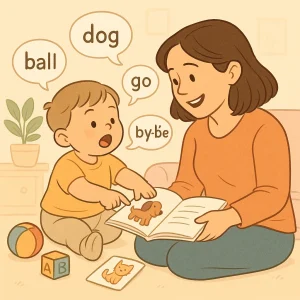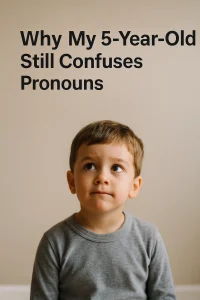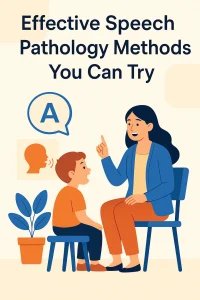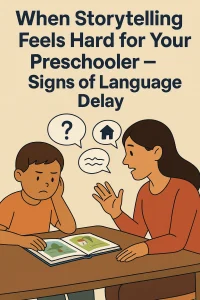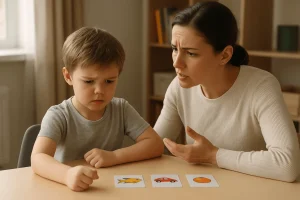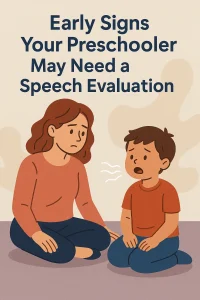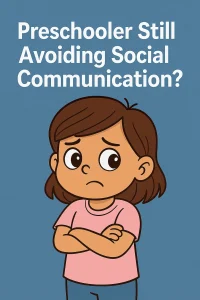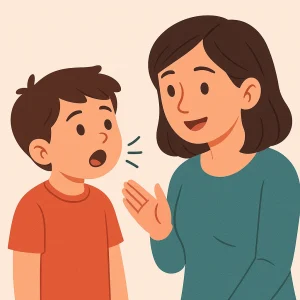Why Isn’t My Child Talking? What I Wish I Knew Sooner
By Rajini D
Last Updated: June 26, 2025
Is your child still not talking much while others their age are chatting away? It’s normal to wonder if it’s just a phase — or something more. While every child develops differently, certain signs can help you spot a possible speech delay early. In this article, you’ll learn what’s typical, what to watch for, and how to gently support your child’s language at home. Early awareness can make a big difference — and give you peace of mind.
Help Your Child Speak Better
Support your child’s speech, language, and confidence with personalized online therapy—fun, expert-led, and from home.
Is It Just a Phase or a Real Speech Delay?
You’ve probably heard it before — “Don’t worry, they’ll talk when they’re ready.”
And while that might be true for some kids, for others, those first words don’t come as expected. If you’re wondering whether your child is just taking their time or actually showing signs of a speech delay, you’re not alone — and you’re asking a very important question.
Let’s break it down in a simple, non-scary way.
Why Some Toddlers Talk Late — And What’s Normal
Every child grows at their own pace. But there are certain milestones that give us a general idea of what’s typical. If your toddler isn’t hitting these speech and language milestones, it might be more than just a phase.
Here’s a quick look at what’s generally expected:
| Age | Typical Speech Milestones |
|---|---|
| 12 months | Babbles, uses simple sounds like “mama” or “dada,” responds to their name |
| 18 months | Says 5–10 words, follows simple directions, points to things |
| 2 years | Uses 50+ words, starts combining 2-word phrases like “more milk” |
| 3 years | Uses short sentences, speech is clearer, follows 2-step instructions |
When to Worry About Your Child’s Speech Development
Here are a few signs that might suggest your child is facing a speech delay rather than just being a “late bloomer”:
- Doesn’t say single words by 15–18 months
- Struggles to follow simple instructions like “Come here” or “Give me the ball”
- Rarely makes eye contact or responds to their name
- Doesn’t use gestures like pointing or waving
- Has trouble imitating sounds or actions
- Is frustrated often when trying to communicate
If a few of these feel familiar, it’s a good idea to speak with a pediatric speech therapist. You’re not overreacting — you’re being proactive.
A Quick Tip:
If your child understands what you say but has trouble speaking, it might be an expressive speech delay. If they struggle to understand or respond, it could be receptive or mixed. Either way, early support can make a big difference.
Common Signs of Speech Delay in Children
How to Spot the Red Flags Early
Every child develops at their own pace, but as a parent, you know your child best. Sometimes, it’s not about comparing your toddler to others — it’s about noticing what feels off. If you’ve been thinking, “My toddler isn’t talking yet — should I be worried?”, trust that instinct. There are some early signs of speech delay that can help you know when it’s time to take a closer look.
Here are some simple red flags to watch for:
1. Not Saying Words by 18 Months
By 18 months, most toddlers use a handful of real words like “mama,” “ball,” or “milk.”
If your child isn’t saying any words at this stage, it’s a good idea to monitor their language closely. Even if they’re babbling, a lack of actual words could suggest a delay in expressive speech.
2. Doesn’t Respond to Their Name
A child not turning their head or reacting when you call their name can be a key early sign — not just of a speech delay, but sometimes of other developmental challenges, like autism or hearing issues.
This doesn’t automatically mean something serious is wrong, but it’s a sign worth checking in with a professional about.
3. Doesn’t Point, Gesture, or Imitate
Before kids talk, they show what they want — by pointing to toys, raising arms to be picked up, or waving bye-bye. These gestures are part of how toddlers communicate.
If your child isn’t using gestures or doesn’t try to copy your sounds or actions, it might be a sign they’re not picking up the early building blocks of communication.
4. Uses Few or No Words by Age 2
By age two, toddlers typically say 50 or more words and begin to put two words together, like “want juice” or “go park.”
If your toddler still uses very few words, or mostly grunts or cries to express themselves, it may point to delayed speech.
Quick check: If you’re hearing a lot of “uh uh” and pointing, but not much actual speech — that’s something to pay attention to.
You Don’t Have to Figure This Out Alone
If you’re noticing one or more of these signs of speech delay in your toddler, know this: early support can make a big difference. At Wellness Hub, we’ve helped many families navigate this stage with personalized online speech therapy, expert guidance, and even home-based tools through our BASICS App.
Download the BASICS App today on Android and iOS to start supporting your child’s speech and language development from home — fun, effective, and therapist-approved.
What I Wish I Knew Sooner as a Parent
Myths That Held Me Back
Looking back, there were so many moments I second-guessed myself.
I heard the comments — well-meaning, reassuring, but ultimately confusing. And for a while, I believed them. I told myself I was just being overly cautious, that it would all work out in time.
But the truth? Some of those beliefs delayed us from getting the help my child actually needed.
Let’s talk about the common myths that many parents hear — and why they can get in the way.
They’ll talk when they’re ready
This one is probably the most common — and the most misleading. Yes, some kids do take longer to start talking. But there’s a difference between a child developing at their own pace and one showing signs of slow speech development.
If your child isn’t saying words, isn’t trying to copy sounds, or doesn’t seem interested in communication — it’s not just about waiting. It’s about checking in.
Early support doesn’t mean something’s wrong. It means you’re tuned in.
Boys talk late — it’s normal
While it’s true that boys can develop language slightly later than girls, that gap is usually small — and shouldn’t be used as a blanket excuse for not speaking at all by age two.
If your little boy isn’t talking, it’s important to look beyond gender and focus on their actual milestones. Late talker signs don’t discriminate — and boys deserve early support just as much as girls do.
They’re just shy
Shyness doesn’t explain everything. Some kids are quiet around new people, sure — but that’s different from not talking at home, not using gestures, or not trying to communicate at all.
If your child is silent most of the time, doesn’t use words to express needs, or avoids eye contact — it could be something more than shyness.
What I Learned the Hard Way
By the time we reached out for help, I realized how many precious months we’d spent waiting. If I had known then what I know now, I would’ve acted sooner — and that’s exactly why I’m sharing this with you.
Why Early Help for Speech Problems Matters
Early Intervention Can Change Everything
When it comes to speech and language development, waiting and watching isn’t always the best plan. The earlier we step in with the right kind of support, the better the outcomes — and not just for talking, but for your child’s learning, behavior, and confidence too.
The Power of the Early Years
Here’s something many parents don’t hear enough: The brain is most flexible during the first 5 years of life. This stage — especially from birth to age 3 — is when the brain is developing connections at a rapid pace. It’s a time of incredible learning potential.
This is why early intervention speech therapy is so powerful. Helping a child during this stage doesn’t just teach them words — it builds a strong foundation for thinking, learning, social skills, and emotional growth.
Avoiding Emotional and Learning Struggles Later
Kids who can’t express themselves often feel frustrated — and that frustration can grow over time. It may show up as tantrums, social withdrawal, or struggles in school later on.
By stepping in early, we can help your child:
- Communicate needs more clearly
- Reduce daily stress (for both of you!)
- Feel more connected to family and peers
- Be ready to succeed in preschool and beyond
Starting early gives your child the tools they need to thrive — not just now, but long-term.
So… What’s the Best Age to Start Speech Therapy?
There’s no perfect age — but generally, earlier is better. Many parents wait until age 3 or 4, but if your toddler isn’t meeting key speech milestones by 18–24 months, that’s a great time to get a professional opinion.
You don’t need a formal diagnosis to begin. In fact, starting even with mild concerns can lead to much faster progress.
What Causes Speech Delay in Children?
Understanding the Root of the Struggle
When your child isn’t speaking the way you expected, it’s natural to wonder why. And while there isn’t always one single answer, understanding the possible causes of speech delay can help you feel more informed and empowered.
Let’s break it down in a simple way — no jargon, just clarity.
Hearing Issues Can Affect Speech
One of the most common — and often overlooked — reasons for speech delay is difficulty hearing.
If your child isn’t hearing words clearly, it’s harder for them to learn how to say them. Even something as simple as frequent ear infections can impact how sounds are processed.
Signs your child may have a hearing issue:
- Doesn’t respond to name or familiar sounds
- Turns up the volume too high
- Watches your face closely when you speak
If you suspect hearing trouble, a hearing test is a great first step.
Developmental Delays — Including Autism or ADHD
Sometimes, speech delay is part of a broader developmental difference. Children with autism or ADHD may have trouble with focus, interaction, or communication — and that can affect how they speak or use language.
Here’s a quick comparison:
| Possible Cause | What You Might Notice |
|---|---|
| Autism Spectrum | Limited eye contact, no pointing, prefers routine, repeats phrases (echolalia) |
| ADHD | High activity level, short attention span, struggles to stay focused during conversation |
| General Speech Delay | Understands language but can’t express thoughts clearly, late to use first words |
The Impact of Excessive Screen Time
In today’s world, screens are everywhere — and sometimes they sneak into our toddlers’ days more than we realize. While a little screen time isn’t harmful, too much passive viewing can affect how kids learn to communicate.
Why? Because children learn language through real-life interaction — watching faces, hearing tone, and responding in turn. Screens can’t replace that.
Tips to reduce screen-related delays:
- Choose face-to-face play over passive videos
- Watch shows together and talk about what’s happening
- Try tech-free routines (like meals or bedtime) for bonding
It’s Not Your Fault — But You Can Take the Next Step
If your child isn’t speaking yet or you feel something’s off, trust your gut. You’re not alone — and figuring out the “why” is the first step to real progress.
At Wellness Hub, we help parents explore these possibilities in a calm, expert-guided way. Whether it’s autism, hearing concerns, or simply a speech delay, our team can guide you with online therapy, progress tracking, and personalized support.
You don’t have to figure it all out on your own. And you don’t have to wait.
What You Can Do at Home to Help
Simple Ways to Support Your Child’s Language
You don’t need fancy tools or flashcards to help your child learn to talk. In fact, the most powerful things you can do happen in your everyday routine — during breakfast, bath time, or a walk in the park.
If you’ve been asking yourself, “How can I help my child talk more?” — the answer might be simpler than you think.
Here are a few easy strategies you can start using today:
Narrate Your Day
Talk to your child about what you’re doing — even if they aren’t talking back yet.
- “I’m pouring the milk.”
- “Let’s wash your hands.”
- “You’re putting on your shoes!”
This helps them connect words to actions and hear language used naturally. Over time, they begin to understand — and then imitate.
This everyday narration builds vocabulary in a stress-free way.
Play Face-to-Face
Get down on your child’s level. Make eye contact. Let them see your face as you speak.
This creates opportunities for:
- Shared attention
- Better imitation of sounds and actions
- Real connection
Face-to-face play is a core strategy in speech therapy — and you can do it right at home.
Repeat Sounds and Words
If your child babbles or makes a sound, repeat it back — and then model a real word.
For example:
- Child says: “ba”
- You say: “Ba? Ball? You want the ball?”
This back-and-forth teaches them that their sounds have meaning, and helps stretch early sounds into real words.
Read Picture Books Every Day
Choose books with:
- Repetition (like “Brown Bear, Brown Bear”)
- Clear, simple images
- Rhyming patterns
Point to the pictures. Name things. Ask questions, even if your child doesn’t answer yet: “Where’s the dog? Oh! There he is!”
Reading isn’t just about stories — it’s about learning the rhythm and flow of language.
Use Simple, Functional Words
Start with words your child can use every day:
- “More”
- “Up”
- “Mama” / “Dada”
- “No” / “Go” / “Ball”
These are often called functional words, and they’re great first targets in early speech therapy. They’re easy to say, motivating, and used often.
Does My Child Need Speech Therapy?
It’s one of the most common (and important) questions parents ask:
“Does my child need speech therapy?”
And if you’re asking it, that already shows how tuned in you are. The truth is, you don’t need to wait for a formal diagnosis or for someone else to raise the flag. If something feels off — or if your child isn’t reaching key language milestones — it’s okay to seek answers.
When to Consult a Pediatric Speech Therapist
Not every child who talks late will need therapy — but many benefit from early guidance. So how do you know when it’s time?
Here are some common signs that might mean your child would benefit from seeing a speech therapist:
- Not saying any words by 18 months
- Has fewer than 50 words by age 2
- Isn’t combining two words like “more juice” or “go car”
- Struggles to express needs (and often cries or gets frustrated instead)
- Doesn’t imitate sounds, gestures, or actions
- Doesn’t respond consistently to their name
- Has unclear speech that’s hard to understand — even for familiar people
If your child checks even a few of these boxes, it may be worth scheduling an evaluation. You’re not overreacting — you’re advocating.
What a Speech Evaluation Looks Like
A speech evaluation isn’t scary or stressful — especially when done by a pediatric speech-language pathologist (SLP). Here’s what you can expect:
- Play-based observation: The therapist will interact with your child in a relaxed, playful setting to see how they communicate.
- Milestone checks: They’ll gently assess whether your child is meeting age-appropriate speech and language skills.
- Parent conversation: You’ll be asked about your child’s behavior, habits, and how they communicate at home.
- Personalized plan: If your child would benefit from support, the therapist will outline next steps — from home activities to one-on-one therapy.
Conclusion
If you’re worried about your child’s speech, trust your gut — you’re not alone, and it’s okay to ask questions. Many parents feel confused or unsure at first. But the earlier you notice and take action, the more you can help your child thrive. Don’t wait and hope it gets better on its own. Speech therapy can make a big difference, even at a young age. At Wellness Hub, we offer expert guidance, one-on-one online sessions, and home support to help your child communicate with confidence.
Frequently Asked Questions:
1. Why is my toddler not talking yet?
Some toddlers talk later than others, but if your child isn’t using words by 18–24 months, it could be a sign of a speech delay. It’s best to check with a speech therapist early.
2. What are the early signs of speech delay in children?
Early signs include not saying words by 18 months, not pointing or using gestures, not responding to their name, and not trying to copy sounds or words.
3. Should I worry if my child doesn’t talk at 2 years old?
Yes, if your 2-year-old isn’t saying simple words or trying to talk, it’s a good idea to speak to a pediatric speech therapist. Early help can really make a difference.
4. What causes speech delay in toddlers?
Speech delay can happen for many reasons — hearing problems, autism, ADHD, or just a language delay. Sometimes there’s no clear cause, but therapy still helps.
5. How do I know if my child needs speech therapy?
If your child isn’t meeting speech milestones, has trouble speaking clearly, or gets frustrated when trying to talk, a speech evaluation can help find the right support
6. Can speech delay go away on its own?
Some kids catch up on their own, but many need support. It’s better to act early than wait. The earlier you start speech therapy, the better the results.
7. What can I do at home to help my child talk more?
You can talk to your child during daily routines, read picture books, sing songs, play face-to-face, and use simple words like “more,” “milk,” or “go.”
8. Is screen time linked to speech delay?
Yes, too much screen time and not enough real conversations can affect how a child learns to talk. Talking and playing with people helps speech more than screens.
9. Where can I get online speech therapy for my child?
At Wellness Hub, we offer online speech therapy with expert pediatric therapists. You can get personalized help, home activities, and track progress through your dashboard.
10. What age is best to start speech therapy?
The best time is as early as possible — even before age 2 if delays are seen. Early therapy supports brain development and helps children catch up faster.
About the Author:
Rajini Darugupally
M.Sc., Speech-Language Pathologist (9+ years of experience)
Rajini is a passionate and dedicated Speech-Language Pathologist with over 9+ years of experience, specializing in both developmental speech and language disorders in children and rehabilitation in adults. Driven by a desire to empower each individual to find their voice, Rajini brings a wealth of experience and a warm, genuine approach to therapy. Currently, at Wellness Hub, she thrives in a team environment that values innovation, compassion, and achieving results for their clients.
Book your Free Consultation Today
Parent/Caregiver Info:
Client’s Details:
* Error Message


